Depression and
Bipolar Disorder:
Your Guide to Recovery
William R. Marchand, MD

Copyright 2012 by Bull Publishing Company
All rights reserved. No part of this publication may be reproduced, distributed, or transmitted in any form or by any means, including photocopying, recording, or other electronic or mechanical methods, without the prior written permission of the publisher, except in the case of brief quotations embodied in critical reviews and certain other noncommercial uses permitted by copyright law.
Published by Bull Publishing Company
P.O. Box 1377
Boulder, CO, USA 80306
www.bullpub.com
Library of Congress Cataloging-in-Publication Data
Marchand, William R.
Depression and bipolar disorder : your guide to recovery / William R. Marchand. -- 1st ed.
p. cm.
Includes bibliographical references and index.
ISBN 978-1-933503-99-8 (pbk.)
1. Manic-depressive illness--Popular works. 2. Depression, Mental--Popular works. 3. Self-care, Health. I. Title.
RC516.M374 2012
616.8527--dc23
2012012064
First Edition
17 16 15 14 13 12 10 9 8 7 6 5 4 3 2 1
Interior design and project management: Dovetail Publishing Services
Cover design: Shannon Bodie, Lightbourne, Inc.
This book is lovingly
dedicated to my readers.
Introduction
BECAUSE YOU ARE READING THIS, chances are that you have a mood disorder or think that you might have one. Or perhaps you are seeking information because you have a loved one with a mood disorder. People who have depression or bipolar disorder frequently have lots of questions. Unfortunately, answers may be hard to find. Appointments with doctors can be rushed, and it may seem like there isnt enough time to ask questions. Many doctors arent great communicators. The medical and mental health literature is difficult to understand (frequently even for professionals) and often contradictory. The bookstore shelves are filled with self-help titles, but few provide the comprehensive information that you need. This book is the missing manual you may have been looking for.
Affective (or mood) disorders are primarily disorders of emotion and come in two basic categories: depressive and bipolar disorders (much more about this later). Depressive disorders cause excessive sadness along with other symptoms. In contrast, people who suffer from bipolar disorders experience both extreme highs and lows. This book provides critical information to support your recovery from either type of disorder. It will also be helpful if you have an adult loved one with a mood disorder. provides a summary of how this book can help. There is saying that information is power. This book is about empowerment. It provides facts that can empower you to take charge of your recovery and get well.
Table I.1 Ways this book can help you
Reading this book can help you:
 Determine whether professional treatment is needed
Determine whether professional treatment is needed
 Find out about evidence-based treatment options and determine which ones may be best for you
Find out about evidence-based treatment options and determine which ones may be best for you
 Seek help and work effectively with your treatment team
Seek help and work effectively with your treatment team
 Maximize treatment benefits
Maximize treatment benefits
 Avoid common obstacles to recovery
Avoid common obstacles to recovery
 Develop a comprehensive recovery plan
Develop a comprehensive recovery plan
 Understand the biological and psychological causes of mood disorders
Understand the biological and psychological causes of mood disorders
 Learn about the benefits of practicing mindfulness
Learn about the benefits of practicing mindfulness
 Select additional books and other resources to support your recovery
Select additional books and other resources to support your recovery
Why you need this book
Mood disorders are very serious and disabling conditions. Worldwide surveys indicate that depression is the fourth leading cause of disability. In fact, depressed individuals spend more time in bed than those with many serious medical conditions, such as high blood pressure, diabetes, chronic lung disease, or arthritis. Bipolar disorders are equally disabling and often much more so. The good news is that effective treatments are available and there are many things you can do on your own to support your recovery. This book will serve as your guide to implement a comprehensive recovery plan.
Unfortunately, many of you may not get better and stay well unless you take control of your recovery. Why? Studies indicate that there are a number of obstacles to getting better. This book directly addresses many of these barriers by providing the information you need to manage your recovery. It provides the information you need in order to get the best possible treatment and optimize the use of complementary approaches. The sole purpose of this book is to empower you to overcome obstacles to getting better.
The following section will help you understand why some people dont achieve full recovery from mood disorders. This information will explain why the strategies recommended in the rest of the book can help you. But, before you read on, one more thing: The next two sections contain a lot of numbers. I think that having detailed information available can be helpful. However, the numbers are not as nearly as important as the message. So I want to be sure the message is clear. These are the take-home points:
 Many people with mood disorders dont get the help they need.
Many people with mood disorders dont get the help they need.
 Misdiagnosis and inadequate treatment can keep those who get treatment from getting completely better.
Misdiagnosis and inadequate treatment can keep those who get treatment from getting completely better.
 Having knowledge can empower you to take charge of your recovery and maximize your chances of obtaining full remission.
Having knowledge can empower you to take charge of your recovery and maximize your chances of obtaining full remission.
Not receiving treatment
Unfortunately, many people who have a mood disorder either never get help at all or delay starting treatment. Ann is an example. She experienced depression for many years before getting treatment. She was diagnosed when she sought psychotherapy for other reasons. I was shocked, she recalls. I knew something was wrong but it never occurred to me that it was depression. Ann is now receiving treatment, which has been helpful for her.
Anns story is not unusual. Among people with any kind of mood disorder, a major study found that only about half ever received treatment. found that only about two-thirds of adults with major depression had received any treatment. These studies tell us that 30%40% of those with mood disorders arent getting any help. Please dont be one of these people.
Why dont people with mood disorders seek help? Sometimes when were sick, we wait to see if things will get better without treatment. Depression can occasionally get better without treatment, but this tends to occur within the first few months. The possibility of spontaneous (without treatment) remission is, at best, around 50%. What does this information mean for you? Most, if not all, individuals with depression will need to take action in order to get better. The same is true for people with bipolar disorder. If you have symptoms of depression that dont go away within a few weeks, please dont wait to see if things will improve on their own. Start down the road to recovery today. This book will guide you through that process.


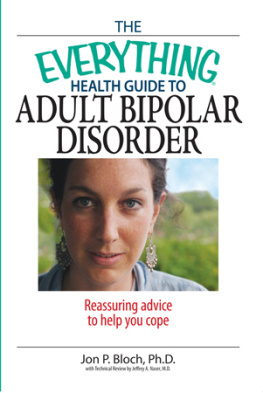
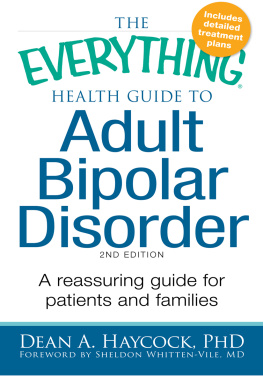
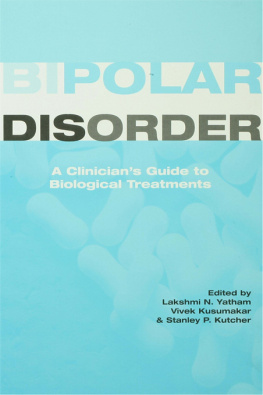

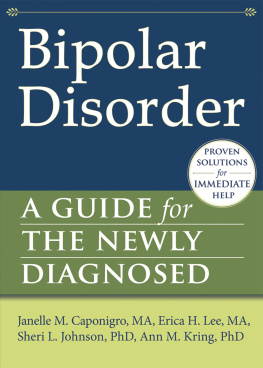
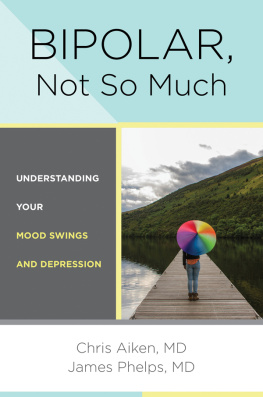
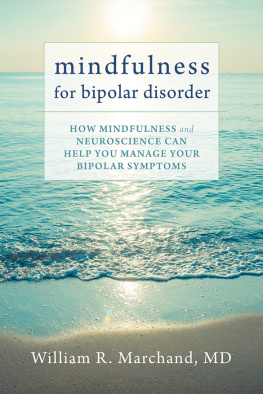

 Determine whether professional treatment is needed
Determine whether professional treatment is needed